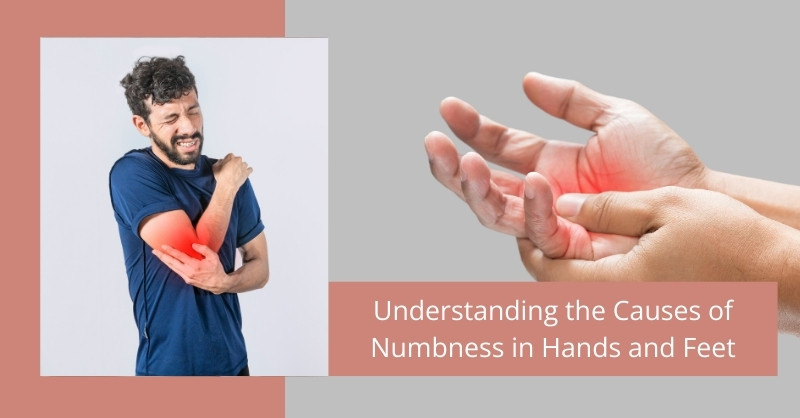Experiencing numbness in hands and feet is a common issue that can range from a mild annoyance to a serious medical concern. Often described as a tingling or “pins and needles” sensation, this condition can affect daily activities and quality of life. Understanding the causes, symptoms, and treatment options for numbness in hands and feet is essential for addressing the problem effectively.
What is Numbness in Hands and Feet?
Numbness in hands and feet refers to a loss of sensation or a tingling feeling in the extremities. This sensation can occur temporarily due to pressure on nerves or persist as a result of underlying health conditions. Recognizing the symptoms and understanding potential causes can help you determine when to seek medical attention.
Causes of Hand and Foot Numbness
1. Nerve Damage (Peripheral Neuropathy)
Peripheral neuropathy is one of the most common causes of numbness in hands and feet. It occurs when nerves outside the brain and spinal cord are damaged, leading to symptoms such as tingling, weakness, and loss of sensation.
2. Diabetes
Numbness in hands and feet diabetes is a prevalent issue among individuals with uncontrolled blood sugar levels. High blood sugar can damage nerves, causing a condition known as diabetic neuropathy.
3. Vitamin Deficiency
Certain vitamin deficiencies, particularly B12, can lead to nerve damage and numbness in hands and feet. Ensuring a balanced diet with sufficient vitamins is crucial for nerve health.
4. Carpal Tunnel Syndrome
Carpal tunnel syndrome affects the hands and wrists but can also contribute to numbness in hands and feet. It occurs when the median nerve is compressed, often due to repetitive movements or wrist strain.
5. Medical Conditions
Conditions like multiple sclerosis, lupus, and fibromyalgia are known to cause numbness in hands and feet. These autoimmune and neurological disorders disrupt normal nerve function.
6. Circulatory Issues
Poor circulation or blood clots can restrict blood flow, leading to numbness in hands and feet. High blood pressure and cardiovascular conditions are often linked to these symptoms.
7. Nerve Compression
Sitting or standing in the same position for extended periods can compress nerves, causing temporary numbness in hands and feet. However, prolonged compression may lead to more severe nerve damage.

Symptoms of Peripheral Neuropathy
- Tingling or “pins and needles” sensation
- Weakness in the affected areas
- Burning or prickling feelings
- Sensitivity to touch
- Loss of coordination or balance
Identifying these symptoms alongside hand and Foot Numbness can provide valuable clues about the underlying cause.
Diagnosing Nerve Dysfunction in Hands and Feet
Diagnosing the root cause of nerve dysfunction in hands and feet often requires a thorough medical evaluation. Common diagnostic methods include:
- Physical Examination: Assessing reflexes, strength, and sensation.
- Blood Tests: Checking for vitamin deficiencies, diabetes, and other systemic conditions.
- Nerve Conduction Studies: Evaluating nerve function.
- Imaging Tests: MRI or CT scans to detect structural issues such as herniated discs or tumors.
Treatment Options for Numbness
1. Addressing Underlying Conditions
Treating the primary condition—such as diabetes or vitamin deficiency—is essential for alleviating tingling and numbness in extremities
2. Medications
Pain relievers, anti-inflammatory drugs, or medications for nerve pain like gabapentin can be prescribed depending on the severity of the symptoms.
3. Lifestyle Changes
Adopting healthy lifestyle habits can prevent and reduce nerve dysfunction in hands and feet. This includes:
- Managing blood sugar levels for diabetics
- Maintaining a balanced diet rich in essential vitamins
- Engaging in regular physical activity to improve circulation
4. Physical Therapy
Therapies designed to improve nerve function and mobility can be highly effective. Exercises targeting hand and foot strength are particularly beneficial.
5. Surgical Intervention
In cases like carpal tunnel syndrome or severe nerve compression, surgery may be required to relieve pressure on the affected nerves.
6. Alternative Therapies
- Yoga: Improves flexibility and blood flow, which can reduce symptoms of hand and foot numbness.
- Acupuncture: Stimulates nerves and enhances circulation, offering relief from tingling sensations.
- Home Remedies: Soaking hands and feet in warm water or using Epsom salt can temporarily ease symptoms.

Prevention Tips for Numbness in Hands and Feet
- Maintain proper posture to avoid nerve compression.
- Avoid repetitive movements that strain the hands and wrists.
- Wear supportive footwear to prevent foot numbness.
- Monitor blood pressure and blood sugar levels regularly.
- Take breaks during long periods of sitting or standing.
When to See a Doctor for Numbness in Hands and Feet
While occasional hand and foot numbness may not be concerning, persistent or worsening symptoms warrant medical attention. Seek professional help if::
- Symptoms interfere with daily life
- Numbness occurs suddenly and is accompanied by other symptoms like dizziness or weakness
- There is no identifiable cause for the numbness
- You suspect it is related to a chronic medical condition
Conclusion
Numbness in hands and feet is a condition that can result from various causes, ranging from temporary nerve compression to serious medical disorders. Understanding the potential causes, recognizing symptoms, and seeking appropriate treatment are vital steps in managing this issue effectively. Whether through lifestyle changes, medical intervention, or alternative therapies, addressing numbness in hands and feet can greatly improve your overall well-being.
By staying informed and proactive, you can take control of your health and minimize the impact of nerve dysfunction in hands and feet on your daily life.
Read this Article: 👉Eating Habits Harm Your Health: Unhealthy Choices and Their Impact
Read this Article: 👉Breathing Exercise Helps to Manage Stress: Techniques for a Calmer Life



